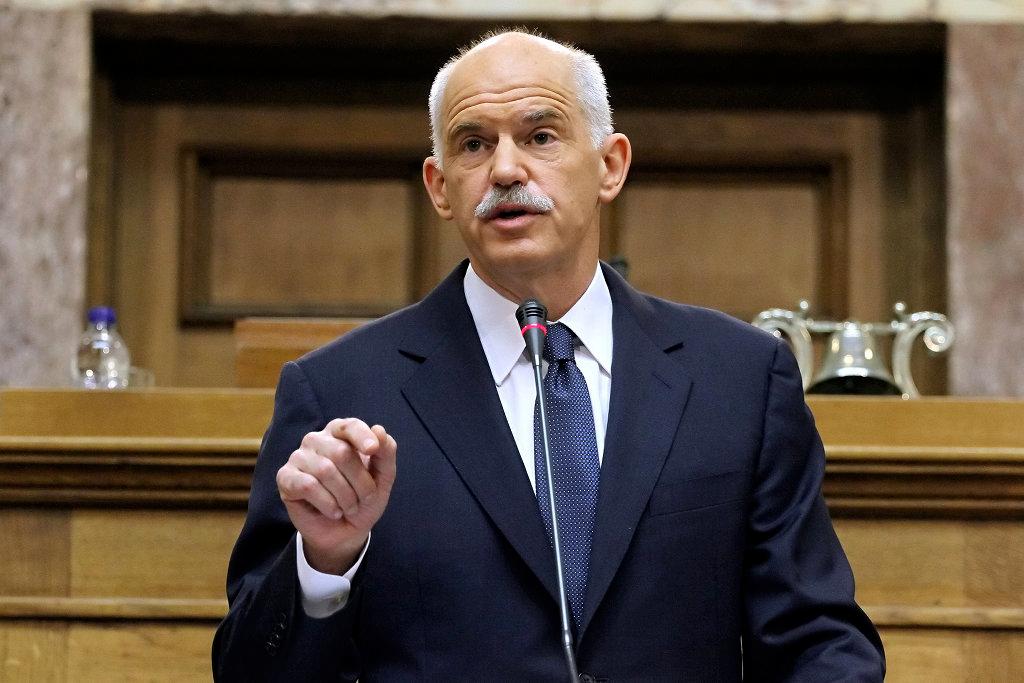Greece sets surprise referendum on bailout
Greek Prime MInister George Papandreou addressing the Greek parliament. His call for a referendum has rattled world markets and angered opposition politicians
Greek Prime Minister George Papandreou announced a referendum on the bail-out deal agreed last week, surprising his people but confounding his European partners. The move sent European stock indexes sharply lower. Both the Paris and Frankfurt bourses had lost more than 5 percent by midday.
Papandreou, addressing the Greek Parliament, said, “Let each Greek person decide; with a ballot paper in his hand, let each person decide for his country and for himself."
It now looks very possible that Papandreou will not survive until that decision. During the course of the day two members of parliament from Pasok, the Prime Minister's political party, resigned from the group to become independents. This leaves him with a one seat majority. Six other members of Pasok called for him to stand down. His Finance Minister Evangelos Venizelos was taken to the hospital after collapsing with stomach pains.
Greece: Ten things you didn't know about Papandreou
There will be an emergency cabinet meeting this afternoon. Some reports from Athens say Papandreou may be forced to step down at that meeting.
The shock around Europe cannot be adequately expressed. Last week it seemed as if the Greek sovereign debt crisis had been more or less settled. Banks holding Greek bonds agreed to a 50 percent haircut — or write down of their value. In return Papandreou agreed to continue the austerity program he has initiated, shrinking the size of the public sector including large scale lay-offs and clawing back of pension promises.
Now French President Nicolas Sarkozy and German Chancellor Angela Merkel, the primary architects of last week's agreement, are to hold an emergency meeting in Cannes tomorrow, one day ahead of the G-20 summit on Thursday.
The discussions take place against a backdrop of chaos. No date was given by Papndreou for the referendum, nor was it clear what the question for Greece's electorate would be. The Greek constitution allows the president to call referendums only on important, non-financial matters, the Financial Times' Alphaville blog notes.
Sweden: Chinese buy Saad. Swedes shrug with indifference.
Papandreou also announced a vote of confidence in his government to be held later this week … but that may be moot following today's meeting.
The Prime Minister's political opposition, right and left, denounced the plan for a vote. Instead they want the government dissolved and a snap general election called. The next scheduled election is in 2013.
At first glance the referendum is less about the bail-out deal than Greece's continued membership in the euro zone. Many opinion polls show Greeks are against the punishing austerity as a price for the bail-out. They also show Greeks want to continue to be part of the single currency. But you can't be in the euro without the bail-out. So in a sense Papandreou is saying to his voters, make up your minds because it is put up or shut up time.
This is another example of how the lack of a political framework to back the single currency at its conception 20 years ago — its democratic deficit — is having repercussions today. It's something Papndreou referred to directly in his speech, "It is not for others to decide but the Greek people to decide … we have faith in the people. We believe in democratic participation. We are not afraid of it."
The story you just read is accessible and free to all because thousands of listeners and readers contribute to our nonprofit newsroom. We go deep to bring you the human-centered international reporting that you know you can trust. To do this work and to do it well, we rely on the support of our listeners. If you appreciated our coverage this year, if there was a story that made you pause or a song that moved you, would you consider making a gift to sustain our work through 2024 and beyond?
